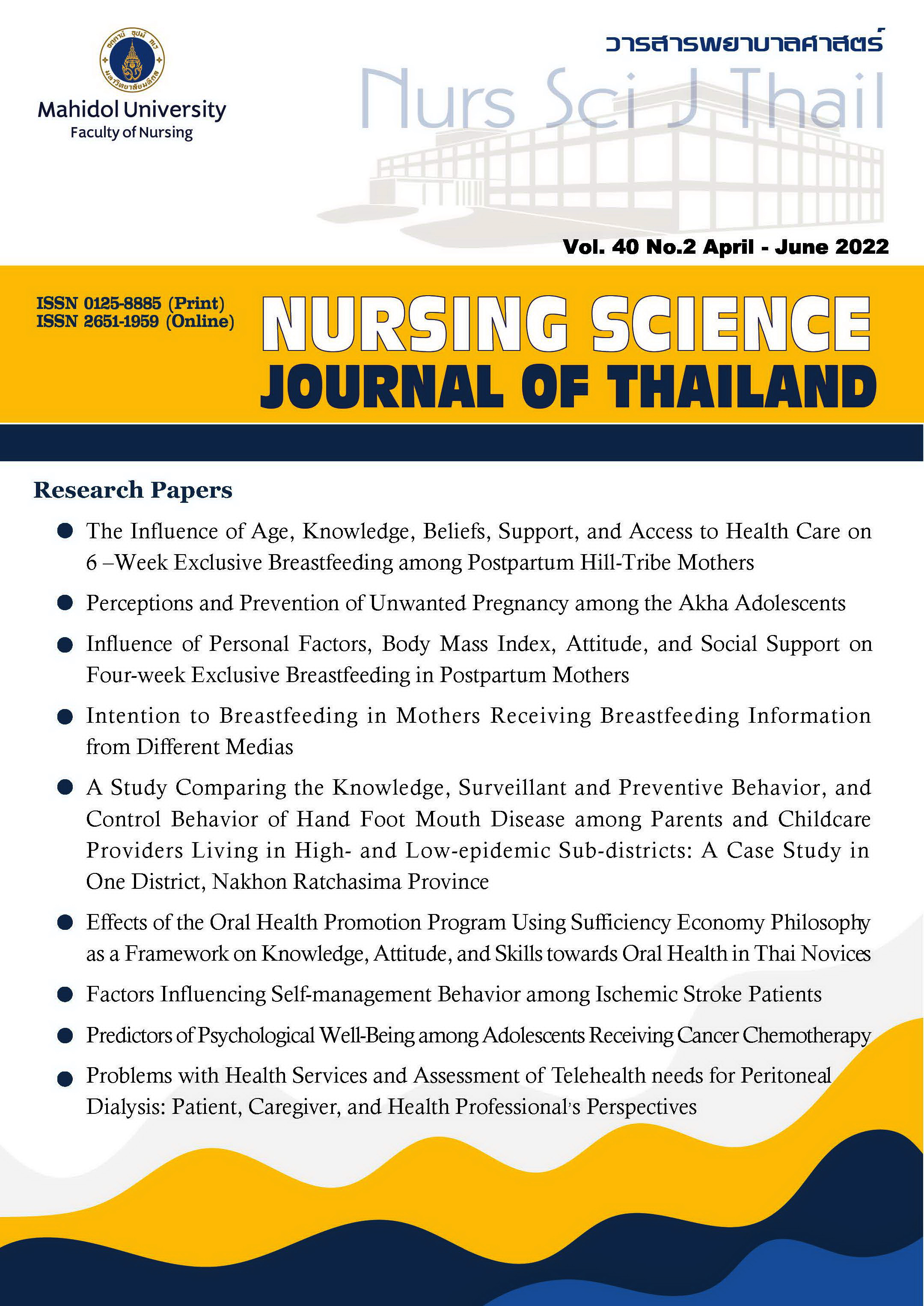Effects of the Oral Health Promotion Program Using Sufficiency Economy Philosophy as a Framework on Knowledge, Attitude, and Skills towards Oral Health in Thai Novices
Main Article Content
Abstract
Purpose: To study the effects of the oral health promotion program using sufficiency economy philosophy as a framework for Thai novices' knowledge, attitude, and skills towards oral health.
Design: A quasi-experimental study using a one-group pre-and post-test design.
Methods: Participants of 104 Thai novices were selected from a rural Buddhist School. Data collection was at baseline, immediately, and one month after program implementing. The research instruments consisted of the personal record form, knowledge about oral health scale, attitude towards oral health scale, and skill towards oral health scale. Paired t-test was used to compare pre-and post-test scores.
Main findings: When compared average scores between baseline and after the program immediately, knowledge toward oral health in Thai novices were significantly decreased (t = 32.03, p < .001) while attitude and skills were significantly increased (t = -96.92, p < .001; and t = -2.64, p = .010, respectively). When compared average scores between baseline and one-month after the program, knowledge and attitudes became increased (t = -56.37, p < .001; and t = -121.42, p < .001, respectively) while skills decreased (t = 2.55, p = .013).
Conclusion and recommendations: The program using sufficiency economy philosophy as a framework could partly support its effectiveness by being able to improve knowledge and attitude, except skills, towards oral health in Thai novices at one-month after the program. The findings suggest that the program needs some revision by increasing the program duration and more attractive activities, as well as having buddy system, for example. Effects of the oral health promotion program using sufficiency economy philosophy as a framework in other specific vulnerable groups such as out-of-school children, layperson, immigrants, or aging people should be further studied.
Article Details

This work is licensed under a Creative Commons Attribution-NonCommercial-NoDerivatives 4.0 International License.
Copyright Notice: Nursing Science Journal of Thailand has exclusive rights to publish and distribute the manuscript and all contents therein. Without the journal’s permission, the dissemination of the manuscript in another journal or online, and the reproduction of the manuscript for non-educational purpose are prohibited.

Disclaimer: The opinion expressed and figures provided in this journal, NSJT, are the sole responsibility of the authors. The editorial board bears no responsibility in this regard.
References
Bureau of Dental Health. The 8th national survey of the oral health report in Thailand. Nonthaburi: Bureau of Dental Health, Department of Health, Ministry of Public Health; 2019 [cited 2021 Feb 9]. Available from: http://dental2.anamai.moph.go.th/ewt_dl_link.php?nid=2423&filename=dental_health_survey. (in Thai).
Division of Strategic Management, Bureau of Dental Health. Guidelines for the implementation of dental public health, the fiscal year 2021. Nonthaburi: Bureau of Dental Health, Department of Health, Ministry of Public Health; 2021 [cited 2021 Feb 9]. Available from: http://dental2.anamai.moph.go.th/ewtadmin/ewt/dental/ewt_dl_link.php?nid=4411&filename=st. (in Thai).
Agrasuta V. Dental service utilization among Thai working age group and elderly in 2013 and 2015 health and welfare surveys. Thai Dental Public Health Journal. 2018;23(1):26-37. (in Thai).
Rugg-Gunn A, Durward C, Ungchusak C, Khitdee C. Early childhood caries – a major public health problem. Thai Dental Public Health Journal. 2017;22 Suppl:1-2.
Rugg-Gunn A, Woodward M. Review of the aetiology of early childhood caries. Thai Dental Public Health Journal. 2017;22 Suppl:14-43.
LA Al-Meedani, YH Al-Dlaigan. Prevalence of dental caries and associated social risk factors among preschool children in Riyadh, Saudi Arabia. Pak J Med Sci. 2016;32(2):452-6. doi: 10.12669/pjms.322.9439.
Peltzer K, Mongkolchati A, Satchaiyan G, Rajchagool S, Pimpak T. Sociobehavioral factors associated with caries increment: a longitudinal study from 24 to 36 months old children in Thailand. Int J Environ Res Public Health. 2014;11(10):10838-50. doi: 10.3390/ijerph111010838.
Raktao U, Wongwech C. Knowledge, attitude, and practice of parents/guardians regarding oral health care of pre-school children. The Southern College Network Journal of Nursing and Public Health. 2015;2(1):52-64. (in Thai).
Tipsodsong A, Pithpornchaiyakul S. Oral health knowledge, attitude, and practices in care providers of visually impaired children. Songklanakarin Dental Journal. 2015;3(1):1-17. (in Thai).
Information Technology Division, Office of the Secretary, National Office of Buddhism. Basic information on Buddhism in 2018-2020. Nakhon Pathom: Office of the Secretary, National Office of Buddhism; 2020 [cited 2021 Feb 9]. Available from: https://onab.go.th/th/page/item/index/id/1. (in Thai).
Department of Surgical Nursing, Faculty of Nursing, Mahidol University. Annual report of cooperate social responsibility project (CSR) of promoting oral hygiene care behavior in novice at Phidum Temple, Inburi District, SinghaBuri Province. 2015. 2 July - 5 August. (in Thai).
Avery GC, Bergsteiner H. Sufficiency thinking: Thailand’s gift to an unsustainable world. Oxfordshire: Routledge; 2016. 328 p.
Barua P, Tejativaddhana P. Impact of application of sufficiency economy philosophy on the well-being of Thai population: a systematic review and meta-analysis of relevant studies. J Popul Soc Stud. 2019;27(3):195-219. doi: 10.25133/JPSSv27n3.0013.
Bergsteiner H, Dharmapiya P. The sufficiency economy philosophy process. In: sufficiency thinking: Thailand’s gift to an unsustainable world. Avery GC, Bergsteiner H, editors. Oxfordshire: Routledge; 2016. p.32-52.
AGH Priya Devadas Nakre. Effectiveness of oral health education programs: a systematic review. J Int Soc Prev Community Dent. 2013;3(2):103-15. doi: 10.4103/2231-0762.127810
Angelopoulou MV, Constantine J, Kavvadia K, Kavvadia O. School-based oral health-education program using experiential learning or traditional lecturing in adolescents: a clinical trial. Int Dent J. 2014;64(5):278-4. doi: 10.1111/idj.12123.
Bertness J, Holt K. Promoting oral health in young children: a resource guide. Washington DC: National Maternal and Child Oral Health Resource Center, Georgetown University; 2013. 24 p.
Ungchusak C. Oral health promotion and prevention of early childhood caries. Thai Dental Public Health Journal. 2017;22 Suppl:45-61.
Buathong C, Promsiripaiboon Y, Vatchalavivat A. The effects of oral health promotion program on dental caries prevention behaviors of grade six students at Ban Banghean School at Plaipraya District, Krabi Province. Community Health Development Quarterly Khon Kaen University. 2015;3(2):293-306. (in Thai).


